
Sharia Council Calls for Safeguarding Fatwas in the Age of Artificial Intelligence
Islamic Scholars Grapple with AI Revolution in Religious Guidance
Religious authorities across the Middle East are confronting a digital transformation that could reshape centuries-old practices of Islamic jurisprudence. As artificial intelligence promises faster access to religious rulings while simultaneously enabling the spread of fabricated fatwas, scholars are calling for urgent institutional reforms to protect the integrity of religious guidance in the digital age.
The AI Opportunity: Speed Meets Sacred Knowledge
Dr. Omar Habtor Al-Darei, head of the UAE's General Authority for Islamic Affairs, Endowments and Zakat, outlined the dual nature of AI's impact on religious jurisprudence during a Cairo conference on "Building the Wise Mufti in the Age of Artificial Intelligence." The technology offers unprecedented opportunities for rapid information retrieval and could enable the development of automated response systems—potentially leading to what he termed "intelligent muftis."
This technological leap mirrors broader digitization efforts across Gulf states, where governments are investing heavily in AI infrastructure. The UAE's AI Strategy 2031 aims to make the country a global AI hub, and religious institutions appear eager to participate in this transformation rather than resist it.
Institutional Innovation in Religious Practice
The concept of AI-assisted religious guidance represents a significant departure from traditional methods where individual scholars would deliberate over complex questions. Modern systems could theoretically process vast databases of Islamic jurisprudence, historical precedents, and contemporary contexts to provide faster, more comprehensive responses to religious inquiries.
However, this efficiency comes with profound theological implications. Islamic jurisprudence has historically relied on human interpretation, contextual understanding, and scholarly consensus—elements that pose significant challenges for algorithmic replication.
The Dark Side: Deepfakes and Doctrinal Manipulation
Al-Darei identified cross-border fabricated fatwas as the most pressing threat facing religious authorities today. The proliferation of deepfake technology enables malicious actors to create convincing videos of respected religious figures issuing false or extremist rulings. These fabricated pronouncements can spread rapidly across social media platforms, potentially influencing millions before authorities can respond.
This challenge extends beyond technical concerns into geopolitical territory. Religious rulings have historically played roles in political movements, and the ability to fabricate authoritative-looking guidance could destabilize communities or provide cover for extremist activities.
Learning from Financial Sector Security
The religious establishment's concerns about AI manipulation echo similar challenges faced by financial institutions combating deepfake fraud and algorithmic manipulation. Banks have invested billions in AI-powered security systems, suggesting that religious authorities may need comparable technological sophistication to maintain credibility.
The parallel is particularly relevant given that religious guidance often intersects with financial matters through Islamic banking principles and charitable giving requirements.
Building Fortress-Like Religious Infrastructure
Al-Darei emphasized that protecting religious jurisprudence from manipulation requires collaboration with AI specialists to build secure, reliable databases that form the scientific foundation for religious rulings. This approach suggests a fundamental shift toward institutionalizing religious guidance rather than relying solely on individual scholarly authority.
The strategy reflects broader trends in Gulf governance, where traditional authority structures are being modernized and systematized. Saudi Arabia's Vision 2030 and similar reform programs across the region demonstrate how traditional institutions are adapting to technological realities while maintaining cultural authenticity.
Regional Coordination and Standards
The Cairo conference's attendance by multiple ministers, religious authorities, and AI experts suggests growing recognition that this challenge requires coordinated regional response. Unlike previous technological disruptions that affected individual institutions, AI's impact on religious guidance could reshape how millions of Muslims worldwide access and understand their faith.
This coordination effort may prove crucial as different countries develop varying approaches to AI governance. The UAE's relatively liberal stance toward technological innovation contrasts with more conservative approaches elsewhere, potentially creating inconsistencies in religious AI applications across the Muslim world.
Market Implications: The Billion-Dollar Question
The intersection of AI and Islamic jurisprudence represents an emerging market opportunity that extends far beyond religious institutions. Islamic finance, currently worth over $3 trillion globally, relies heavily on religious compliance certification. AI systems capable of providing rapid, authoritative religious guidance could significantly streamline Islamic banking operations and reduce compliance costs.
Technology companies developing AI solutions for religious applications could find substantial demand across Muslim-majority countries, particularly as governments seek to maintain religious authority while embracing digital transformation. However, the sensitivity of religious content and the need for scholarly validation may limit market entry to companies willing to invest heavily in theological expertise and cultural understanding.
The ultimate success of AI integration in Islamic jurisprudence will likely depend on whether religious authorities can maintain public trust while embracing technological efficiency—a balance that could define the future relationship between faith and artificial intelligence across the Muslim world.
Most Viewed News

 Layla Al Mansoori
Layla Al Mansoori






